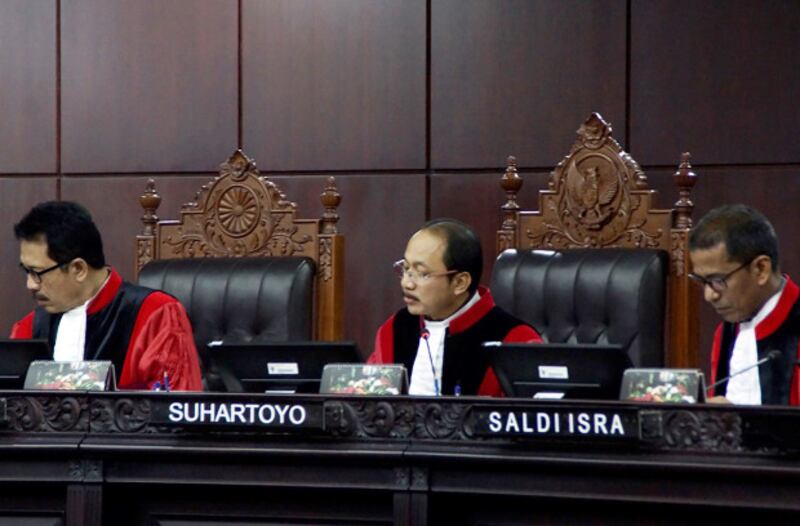Indonesian activists and non-governmental groups filed a lawsuit Wednesday challenging a newly amended law that would allow people to go to jail for criticizing national politicians.
The revised Law on Representative Assemblies, also known as the MD3 law, came into force last week after the 560-member House of Representatives passed it in February, despite criticism from legal and media groups. They warned it could impinge on free speech and undermine the ability of Indonesians to hold politicians accountable.
On Wednesday in Jakarta, representatives of the Law and Constitution Study Forum (FKHK), People’s Solidarity Network of the Indonesian Solidarity Party (PSI) and two college students appeared before the Constitutional Court to urge the judges to overturn the amended law, which they described as unconstitutional.
“We are requesting to the Constitutional Court of Justice, to declare that Article 73, points 3, 4, 5, and 6, are against the Constitutional Law of 1945, and does not have a sustainable legal force,” Irman Putra Sidin, a lawyer representing FKHK, told the court.
Irman was referring to a part of the amended law that empowers House (DPR) legislators to bring charges against people who "undermine its honor or that of its members.”
Under the amendment, the House can place a person under arrest for more than 30 days, critics said.
The changed law, also permits House members to sue people whom they believe have “tainted” the honor of lawmakers, according to FKHK. Additionally, the group said, the amendment stipulates that the House Ethics Committee must first approve investigations into members of parliament before they are forwarded to the Office of the President for approval.
According to critics, the primary target of the new law is likely the KPK, the nation’s beleaguered Corruption Eradication Commission. In December last year, prosecutors from the commission charged former parliamentary speaker Setya Novanto, accusing him of receiving at least U.S. $7.3 million in kickbacks in one of Indonesia’s biggest graft scandals.
Komarudin, an advocate for the People’s Solidarity Network, told the court that the new law would suppress criticism of parliamentarians.
“The phrase that said [any investigation] should have [the Ethics Committee’s] consideration will obstruct investigations,” he said. “Because senators who are being investigated cannot be questioned.”
But Bambang Soesatyo, the new House speaker, issued an assurance Thursday that the amendment would not quash public criticism of lawmakers.
“I guarantee that anyone who criticizes the House will not be criminalized or taken to the legal field,” Bambang told reporters, according to Tempo, an Indonesian news website.
As for President Joko “Jokowi” Widodo, he said he had decided not to sign the updated law, allowing it instead to go into effect automatically, as he cited potential public unrest over the controversial articles.
“I understand and I know that … the law will remain valid even without my signature. Therefore, to solve the issue, the public is welcome to file a judicial review with the Constitutional Court,” Jokowi said Thursday on his Twitter feed.

Backed by Jokowi’s party
Among the eight political parties that supported the amendments was the Indonesia Democratic Party of Struggle (PDIP), Jokowi’s party. For months, party members had been calling for MD3 to be passed. The United Development Party and the National Democratic Party protested the legislation, but they were outvoted.
Opponents of the law said it would defang agencies such as the KPK by requiring investigators and law-enforcement agencies to first consult the House Ethics Committee before any legislator can be legally pursued.
Critics said the revised law could criminalize criticism of the endemic corruption in Indonesia, where at least eight lawmakers have been arrested for corruption in recent years, including Setya. He has faced allegations of corruption in the past but has never been convicted.
Setya was accused of taking part in a conspiracy of dozens of officials who used the project called e-KTP to embezzle more than $170 million of state funds. He denied the allegations that became public last year.

